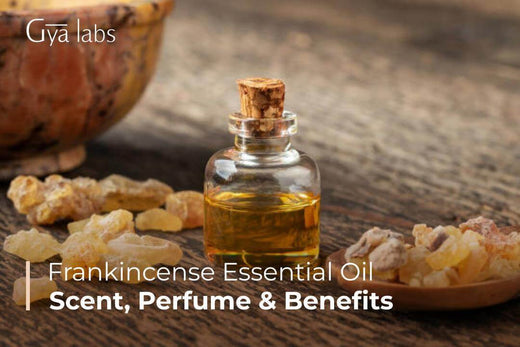In the enchanting world of fragrances, few scents can rival the captivating allure of jasmine. Just mentioning its name conjures images of moonlit gardens and romantic escapades.
But What Exactly Does Jasmine Smell Like?
This question has ignited the curiosity of scent enthusiasts and seekers of natural remedies alike. The scent of jasmine oil is a harmonious blend of floral and exotic notes of jasmine, creating a fragrance that is both alluring and soothing. It carries the sweetness of freshly bloomed jasmine flowers, reminiscent of nectar-laden petals that beckon to bees and butterflies.
In essence, jasmine oil smells like a garden in full bloom that blends into a symphony of fragrance that lingers in the air, leaving an indelible mark on the senses. Jasmine is also known as Poet's Jasmine or Summer Jasmine.
What Is Jasmine Oil?
Jasmine is often referred to as the perfume of love. Jasmine oil is a fragrant essential oil extracted from the flowers of the jasmine plant, scientifically known as Jasminum. This plant is cherished for its beautiful blossoms and their captivating scent. The extraction of jasmine oil is a meticulous process that involves capturing the aromatic compounds found within the flowers.
There are several varieties of jasmine used for oil extraction, with Jasminum grandiflorum (also known as Royal Jasmine or Spanish Jasmine) and Jasminum officinale (Common Jasmine) being two of the most popular species.
The oil is typically obtained through solvent extraction or steam distillation, carefully preserving the volatile aromatic molecules that give jasmine oil its distinctive fragrance.
How Is Jasmine Oil Extracted?
Jasmine oil is extracted from the delicate flowers of the jasmine plant using various methods, each aimed at capturing the aromatic compounds that give the oil its distinctive and enchanting scent. The two primary extraction methods for jasmine oil are solvent extraction and steam distillation.
Jasmine oil is extracted from the delicate blossoms of the jasmine plant using various methods. The two most common methods of extraction are solvent extraction and steam distillation. Each method has its advantages and yields jasmine oil with slightly different characteristics.
Solvent Extraction: Solvent extraction is a process that involves using a solvent, usually hexane, to separate the aromatic compounds from the jasmine flowers. Here's a brief overview of the process:
-
Freshly harvested jasmine flowers are placed in a container, and a solvent is added.
-
The solvent dissolves the aromatic compounds present in the flowers, resulting in a solution known as "concrete."
-
The concrete is then subjected to further processing to remove the solvent and isolate the essential oil. This can involve using alcohol to separate the oil from the concrete.
-
The remaining mixture is chilled, causing the waxy part to solidify and separate from the essential oil.
-
The liquid portion is carefully decanted or filtered for pure jasmine absolute oil.
-
Solvent extraction is often preferred for flowers like jasmine, where traditional steam distillation might yield less oil due to the delicate nature of the petals.
Steam Distillation: Steam distillation is widely used for extracting essential oils from various plant materials, including flowers. However, it is less commonly used for jasmine due to the delicate nature of jasmine blossoms. The process involves the following steps:
-
Jasmine flowers are loaded into a distillation chamber, and steam is passed through them.
-
The steam causes the aromatic compounds within the flowers to evaporate.
-
The steam and vaporized aromatic molecules rise into a cooling system, condensing back into a liquid state.
-
The condensed liquid, which consists of water and essential oil, is collected.
-
Since jasmine flowers are delicate, the steam distillation process for jasmine oil requires careful control of temperature and pressure to avoid damaging the flowers and capture the soothing aroma.
It's important to note that while steam distillation yields essential oil, solvent extraction produces jasmine absolute, which has a slightly different composition and aroma.
Jasmine Essential Oil vs. Jasmine Absolute
|
Aspect |
Jasmine Oil |
Jasmine Absolute |
|
Extraction Method |
Steam distillation |
Solvent extraction |
|
Plant Part Used |
Blossoms of the jasmine plant |
Blossoms of the jasmine plant |
|
Aroma |
Floral, slightly woody and sweet smell |
Rich, full-bodied, true to flower |
|
Composition |
Contains essential oil compounds |
Contains essential oil compounds |
|
Solvent Residue |
None |
Trace amounts of solvent residues |
|
Cost |
Generally more expensive |
Generally less expensive |
|
Quantity Yielded |
Lower yield due to delicate petals |
Higher yield due to extraction |
|
Usage |
Aromatherapy, perfumery, skincare |
Perfumery, cosmetics, fragrance |
|
Aromatherapy |
Used for relaxation, calming |
Used for emotional balance, calm |
|
Perfumery |
Blending, top/mid notes in perfumes |
Heart/base notes in perfumes |
|
Naturalness |
May contain minor alterations |
Often considered truer to flower |
|
Consistency |
Liquid |
Viscous liquid or semi-solid |
According to Razi Journal of Medical Sciences, Vol 29 (2023), jasmine oil is known to effectively reduce stress and anxiety and lift mood.
Jasmine Scent and Essence
The captivating scent of jasmine oil is attributed to its complex composition of aromatic compounds. While numerous constituents contribute to its delightful fragrance, a few essential blends stand out as significant contributors to the unique and enchanting smell of jasmine oil:
Benzyl Acetate: This compound imparts a sweet, fruity, and slightly floral aroma to jasmine oil. It contributes to the delicate and inviting top notes that make jasmine oil enticing.
Benzyl Alcohol: Known for its pleasant and mildly floral scent, benzyl alcohol adds a touch of warmth to the overall fragrance profile of jasmine oil.
Indole: Indole is responsible for jasmine oil's rich, intense, and almost narcotic undertones. It gives the oil its characteristic depth and sensuality.
Jasmine: Jasmine is a significant compound in jasmine oil, responsible for its floral and slightly fruity aroma. It contributes to the heart and mid-notes of the fragrance, providing a pleasant and lingering scent.
Methyl Anthranilate: This compound lends a sweet, grape-like nuance to the fragrance, enhancing the sweetness and complexity of jasmine oil's aroma.
Eugenol: Eugenol adds subtle spiciness and warmth to jasmine oil's scent profile. It contributes to the oil's overall richness and depth.
Phytol: Phytol offers a mild, green, and slightly woody note to the fragrance of jasmine oil, adding to its overall complexity.
According to the Natural Products Communications Journal, Jasmine oil has a Stimulating Effect by Aromatherapy Massage and is also seen to promote relaxation and uplift mood in humans.
Benefits of Using Jasmine Oil
Jasmine oil, derived from the delicate petals of the Jasmine flower, is more than just a fragrant essence. Its captivating aroma has been cherished for centuries for its intoxicating scent and its wide array of therapeutic and beauty benefits. Let's unveil the enchanting world of jasmine oil and explore how it can elevate your well-being and skincare regimen.
1. Aromatherapy Elixir
Jasmine oil is known for its powerful aromatherapy properties. Inhaling its sweet, floral aroma can profoundly impact your mood, reducing stress and anxiety. It will promote a sense of calm and relaxation. Incorporating jasmine oil into your daily routine can create a soothing sanctuary where the day's worries gently melt away.
2. Mood Uplifter
The aroma of jasmine oil can remarkably uplift your spirits. Its scent stimulates the release of certain neurotransmitters that contribute to positive emotions, making it a natural mood enhancer. Diffuse jasmine oil in your living space, or add a few drops to a warm bath to experience its mood-lifting effects.
3. Skin Nourishment
Jasmine oil is a treasure trove of skin-loving benefits. Its moisturizing properties make it an excellent addition to skincare routines, helping to hydrate and soften the skin. It also possesses antioxidants that combat free radicals, promoting a healthy complexion and reducing the appearance of fine lines and wrinkles.
4. Scar and Stretch Mark Minimizer
Due to its cell-regenerating properties, jasmine oil can assist in fading scars and stretch marks over time. Regular application on affected areas can encourage skin renewal and reduce the visibility of these imperfections, restoring a more even skin tone.
5. Aphrodisiac Influence
Jasmine oil has earned its reputation as an aphrodisiac for its alluring scent and potential to increase sensuality. Its aroma is believed to awaken passion and desire, making it a popular choice for creating a romantic atmosphere.
6. Hair Elixir
Jasmine oil can promote healthy, lustrous locks when incorporated into hair care routines. It's known to nourish the scalp, help control frizz, and enhance the overall health of your hair. Add a few drops to your shampoo or mix it with a carrier oil for a revitalizing scalp massage.
7. Sleep Aid
The soothing scent of jasmine oil can contribute to a restful night's sleep. By diffusing jasmine oil in your bedroom or incorporating it into your pre-sleep routine, you can create an environment conducive to relaxation and peaceful slumber.\
8. Antiseptic and Antispasmodic
Jasmine oil possesses antiseptic properties that can help protect wounds from infections. Additionally, its antispasmodic qualities make it a potential remedy for alleviating muscle cramps and spasms.
Uses of Jasmine Oil
Jasmine oil has few health benefits; some uses of jasmine oil are as follows:
1. Aromatherapy
Diffuse jasmine oil to create a calming and relaxing ambiance to reduce stress and anxiety.
2. Perfumery
Add jasmine oil to perfumes and colognes for its exquisite floral fragrance and depth.
3. Skincare
Incorporate jasmine oil into skincare routines to promote skin health, hydration, and a natural glow.
4. Massage
Dilute jasmine oil in carrier oil for a sensual and soothing massage experience.
5. Bathing
Add a few drops of jasmine oil to your bathwater for a luxurious and aromatic bathing ritual.
6. Hair Care
Blend jasmine oil with carrier oils to nourish and condition hair, promoting shine and manageability.
7. Aromatic Accessories
Apply jasmine oil to aromatherapy jewelry or fabric for a lasting and personal fragrance.
8. Emotional Well-Being
Inhale jasmine oil's aroma uplifts mood, reduces tension, and enhances relaxation.
9. Meditation
Use jasmine oil during meditation for a serene and calming atmosphere that enhances focus.
10. Aphrodisiac
The sensual aroma of jasmine oil has been traditionally associated with enhancing romantic experiences.
11. Sleep Aid
Diffuse jasmine oil in the bedroom to create a soothing environment that promotes restful sleep.
12. Beauty Products
Incorporate jasmine oil into lotions, creams, and serums for its fragrant and skin-loving properties.
13. DIY Products
Create homemade candles, soaps, and bath salts infused with the enchanting scent of jasmine oil.
14. Room Freshener
Create a natural room spray using jasmine oil to eliminate odors and add a pleasant fragrance.
15. Relaxation Rituals
Enhance relaxation practices such as yoga or deep breathing with the calming aroma of jasmine oil.
16. Natural Deodorant
Add jasmine oil to a DIY blend for a fresh and floral scent.
17. Confidence Booster
Use jasmine oil as a personal fragrance to boost confidence and enhance self-esteem.
18. Skin Hydration
Apply diluted jasmine oil to dry skin areas for a hydrating and aromatic solution.
19. Aftershave
Mix jasmine oil with carrier oil and apply after shaving for a soothing and fragrant post-shave experience.
20. Stress Relief
Inhale jasmine oil's aroma during stress or tension to promote relaxation.
Jasmine Oil Blend: DIY Recipes for Aromatherapy
Enjoy the beautiful aromas and benefits of jasmine oil in these creative and indulgent homemade products. Remember to perform a patch test before applying DIY recipes to your skin, especially if you have sensitive skin or allergies.
Recipe #1 - Jasmine-infused Relaxing Bath Salts
Ingredients
-
1 cup Epsom salt
-
1/4 cup baking soda
-
10-15 drops of jasmine oil
-
2 drops of Eucalyptus
Instructions
-
In a bowl, combine the Epsom salt and baking soda.
-
Add the jasmine oil and mix well to distribute the scent.
-
Transfer the mixture to an airtight container.
-
Add a few tablespoons to your bathwater for a soothing and aromatic bathing experience.
Recipe #2 - DIY Jasmine Massage Oil
Ingredients
-
1/4 cup carrier oil (such as sweet almond oil or jojoba oil)
-
10 drops of jasmine oil
-
3 drops of Bergamot essential oil
Instructions
-
Combine the blend in a small glass bottle.
-
Shake well to blend the oils.
-
Use this fragrant massage oil to relax and unwind during a massage or as a moisturizer. Its calming properties help people experiencing insomnia.
Recipe #3 - Jasmine and Lavender Pillow Spray
Ingredients
-
1/2 cup distilled water
-
1 tablespoon witch hazel
-
10 drops of jasmine oil
-
10 drops of lavender oil
-
2 drops of lemon essential oil
Instructions
-
Mix the distilled water and witch hazel in a spray bottle, and shake well.
-
Mist your pillow and bedding before sleep to create a sleep-inducing atmosphere with a sweet scent and citrus base notes. Due to some hints of lemon essential oil, it has some antibacterial properties.
Recipe #4 - Jasmine-Infused Body Scrub
Ingredients
-
1 cup granulated sugar
-
1/4 cup carrier oil (such as coconut oil or olive oil)
-
10-15 drops of jasmine oil
-
3 drops of Frankincense essential oil
Instructions
-
In a bowl, combine the granulated sugar and carrier oil.
-
Pair the jasmine oil and mix thoroughly.
-
Gently scrub your body in the shower using the mixture to exfoliate and indulge in the aromatic experience.
Recipe #5 - Jasmine Scented Candles
Ingredients
-
Soy wax flakes
-
Candlewick
-
10-15 drops of jasmine oil
-
Candle container
Instructions
-
Melt soy wax flakes according to package instructions.
-
Place the wick in the center of the candle container.
-
Add jasmine oil to the melted wax and stir.
-
Pour the scented wax into the container to cool and solidify.
-
Trim the wick and light your jasmine-scented candle for a relaxing and aromatic ambiance.
Recipe #6 - Jasmine Green Tea Blend
Ingredients
-
2 tablespoons loose tea leaves
-
1 tablespoon dried jasmine flowers or buds
-
1 teaspoon dried lemon or orange peel (for a citrusy twist)
-
Honey or sweetener of your choice
Directions
-
Mix the loose tea leaves, dried jasmine flowers, and dried lemon in water.
-
Once the water boils, add any sweetener of your choice.
-
Sip and relish the fragrant cup of Jasmine Green Tea. Allow its delicate floral notes to transport you to tranquility and sensory delight.
Conclusion
The scent of jasmine oil is like a delicate dance of petals under the moonlight, a symphony that unfolds in layers of sweetness, sensuality, and sophistication. Its floral notes evoke the image of whole blossoms, inviting us to explore moonlit gardens and embrace the serenity of nature's embrace.
Jasmine oil transports us to a world of elegance and tranquility with each inhale. Its sweet embrace envelops us, carrying whispers of emotion and enchantment. The intoxicating aroma can calm the mind, uplift the spirit, and ignite passion. It is a fragrance that lingers, leaving an indelible mark on our senses and memories.















